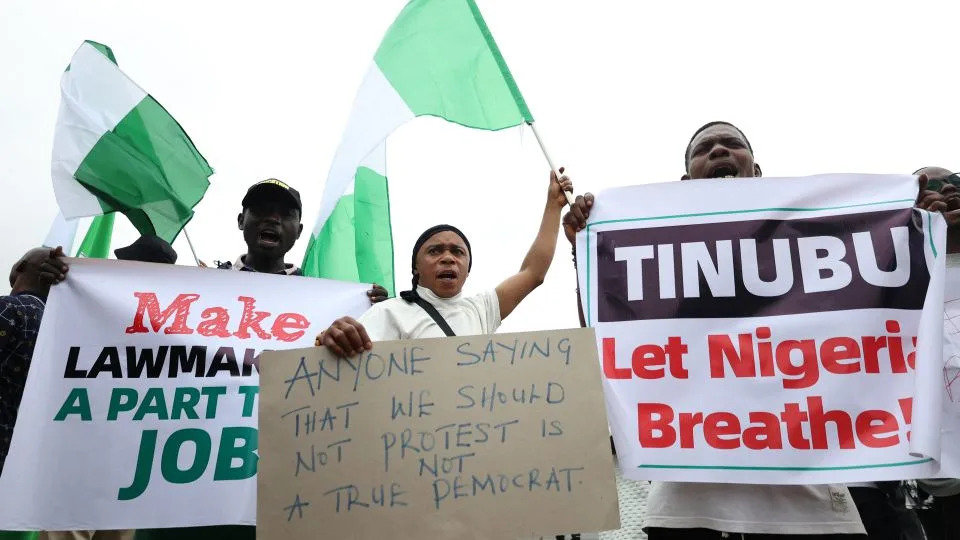‘My dad is a climate denier’: The Just Stop Oil poster girl who went from private school to prison
Jim Norton
THE TORY TELEGRAPH!!!
Thu, August 1, 2024

The image of Plummer, alongside her fellow activist Anna Holland, became iconic for the Just Stop Oil movement - PA
Growing up in a multimillion-pound Chelsea townhouse and afforded the finest private education, Phoebe Plummer knew nothing but privilege for the first 21 years of her life.
The star student made the most of it too, as a high achiever at her £50,000-a-year sixth form, St Mary’s School Ascot, and securing a place to study Computer Science at Manchester University. A comfortable life surely beckoned – perhaps, like her father and two older brothers, pursuing a lucrative career in insurance.
Yet, two years ago, a defining, headline-grabbing moment saw the promising student spurn her loving, middle-class background and settle on a decidedly different route in life – one of civil disobedience, handcuffs, and, ultimately, prison cells. On October 14, 2022, Ms Plummer made headlines across the world as she walked into the National Gallery and threw a tin of soup over Vincent Van Gogh’s masterpiece Sunflowers, worth an estimated £72.5 million, all in the name of climate justice.
The stunt, and her subsequent arrest, launched the pink-haired eco-warrior into the limelight – and set her on the path to becoming the “poster girl” for the controversial campaign group, Just Stop Oil (JSO).
The 22-year-old has since repeatedly broken her bail conditions to go on protest marches; she has attempted to confront MPs on their doorsteps, and, just this week, sprayed orange paint on departure boards at Heathrow Airport Terminal 5.
Given her generous upbringing, it is unsurprising that her transformation has not gone down well with her family. One of Ms Plummer’s brothers reportedly no longer talks to her, while her relationship with her father is said to be strained.
So how did it come to this? After St Mary’s School Ascot, whose alumni include the Duke of Kent’s grandchildren and the Princess of Monaco, Plummer joined Mander Portman Woodward College in Kensington, London, named “spoilt brat central” by Vice magazine in 2006, where she received top marks in her Chemistry, Computer Studies, and Maths A Levels. All was going well.
To those close to her, though, her change in direction was by no means a Damascene conversion. Ms Plummer – who identifies as queer and “non-binary but female-presenting” – had in her late teenage years increasingly embraced the counterculture. She went vegan, stopped flying, and stopped buying first-hand clothes. And, like many Gen Zers, she began to rally behind the climate cause, fearful of the existential risk it posed to her future, and was soon signing petitions, writing to MPs and joining marches.

Ms Plummer has repeatedly broken the conditions for her bail and was arrested earlier this week at Heathrow - Denise Baker / Story Picture Agency
With a London drawl, Ms Plummer is an eloquent and confident speaker, if a little blunt. (Readers may have watched her run-ins live on air with figures from former Conservative MP Jacob Rees Mogg to the BBC’s Victoria Derbyshire). She is well-versed in climate-speak, trotting out the same bitesize quotes in various interviews and rarely straying off topic. That is aside from one interview she gave in April last year to Tipping Points, a little-known podcast by a PHD student at Imperial College London.
Speaking with an ankle tag on, she gave a far more intimate take on why she felt it necessary to risk everything to become JSO’s agitator-in-chief. “It would be naive for me to turn around and say, ‘I have no worries about having a criminal record or having been to prison,’” she told the host. “It’s a big step to take. But for me, I had a flip in my brain where I thought all of these plans and hopes and aspirations I have for my future, for a career, for a family. They don’t exist unless I fight for a future in which they’re possible.”
“Right now, the only future I see for myself is one of mass famine and constant drought, of wildfires and floods, and societal collapse. There’s no career on that kind of planet. There’s no having a family on that planet. So direct action is the best way I can secure my future – not with a university degree as it should be.”

Plummer: 'The only future I see for myself is one of mass famine' - Tom Bowles
Ms Plummer’s first short stint in prison was in November 2022, when she should have been enjoying her Fresher’s term at The School of Oriental and African Studies in London after dropping out of Manchester. Instead, she was sent to HMP Bronzefield on remand after breaking bail conditions. A fortnight after the Van Gogh arrest, she joined dozens of other JSO protestors in blocking the M25, causing four-days of travel chaos.
Though intended as a punishment, Ms Plummer told the podcast that enduring Europe’s biggest female prison – whose 540 inmates reportedly include Lucy Letby – was in fact “very doable, very manageable”. Lying in the shadow of Heathrow airport, the privately-run jail is said to be one of the nicer places in the UK to be incarcerated, with the amount spent per prisoner £10,000 higher than at any other comparable facility in the country. It was reportedly the first in the UK to have its own branch of the Women’s Institute, which provides prisoners with resettlement programmes prior to their release. Inspectors in a recent report praised the “impressive array” of activities on offer for prisoners, which include Zumba and “legs, bums, and tums” classes.

The women's prison HMP Bronzefield, which has been commended for the wellbeing activities it offers - PA
During Ms Plummer’s first spell, nearly two dozen inmates staged a production of West End musical Betty Blue Eyes that was “deemed a great success”. Allowed to share a cell with a fellow JSO activist, and regularly seeing others who had taken action over the M25, she said: “It was nice in prison because there’s the space and the time to have the conversations about why you’re there.” Ms Plummer – who said her greatest heroes the Suffragettes had also faced jail in their fight for social change – added: “I think my biggest power in there was knowing I was in there for the right reasons.”
The impact on her family, however, was not quite so easy. “My family have struggled to deal with it,” she told the podcast. “One of my brothers told me I wasn’t his sister anymore, and that he wanted nothing more to do with me, and that he was ‘beyond disgusted’ and ashamed by me. And that’s harder, I can’t pretend that it’s not.” She told the host how, after her brother got engaged and spoke about wanting to start a family, she told her mother: “When they have children, I will feel more grief than joy.” This reaction was, she said, because she was “so scared about the world that their child would grow up in”.
Conversations with her father, meanwhile, have been painful. “My dad is a climate denier,” she said, “which makes it very hard to even start having the conversations about why I do what I do”. Though initially causing her deep anger, they have tried to find common ground and rebuild their relationship, connecting “more on an emotional level, about why I’m so scared, so outraged a lot of the time, than on a pure scientific basis”.
Thu, August 1, 2024

The image of Plummer, alongside her fellow activist Anna Holland, became iconic for the Just Stop Oil movement - PA
Growing up in a multimillion-pound Chelsea townhouse and afforded the finest private education, Phoebe Plummer knew nothing but privilege for the first 21 years of her life.
The star student made the most of it too, as a high achiever at her £50,000-a-year sixth form, St Mary’s School Ascot, and securing a place to study Computer Science at Manchester University. A comfortable life surely beckoned – perhaps, like her father and two older brothers, pursuing a lucrative career in insurance.
Yet, two years ago, a defining, headline-grabbing moment saw the promising student spurn her loving, middle-class background and settle on a decidedly different route in life – one of civil disobedience, handcuffs, and, ultimately, prison cells. On October 14, 2022, Ms Plummer made headlines across the world as she walked into the National Gallery and threw a tin of soup over Vincent Van Gogh’s masterpiece Sunflowers, worth an estimated £72.5 million, all in the name of climate justice.
The stunt, and her subsequent arrest, launched the pink-haired eco-warrior into the limelight – and set her on the path to becoming the “poster girl” for the controversial campaign group, Just Stop Oil (JSO).
The 22-year-old has since repeatedly broken her bail conditions to go on protest marches; she has attempted to confront MPs on their doorsteps, and, just this week, sprayed orange paint on departure boards at Heathrow Airport Terminal 5.
Given her generous upbringing, it is unsurprising that her transformation has not gone down well with her family. One of Ms Plummer’s brothers reportedly no longer talks to her, while her relationship with her father is said to be strained.
So how did it come to this? After St Mary’s School Ascot, whose alumni include the Duke of Kent’s grandchildren and the Princess of Monaco, Plummer joined Mander Portman Woodward College in Kensington, London, named “spoilt brat central” by Vice magazine in 2006, where she received top marks in her Chemistry, Computer Studies, and Maths A Levels. All was going well.
To those close to her, though, her change in direction was by no means a Damascene conversion. Ms Plummer – who identifies as queer and “non-binary but female-presenting” – had in her late teenage years increasingly embraced the counterculture. She went vegan, stopped flying, and stopped buying first-hand clothes. And, like many Gen Zers, she began to rally behind the climate cause, fearful of the existential risk it posed to her future, and was soon signing petitions, writing to MPs and joining marches.

Ms Plummer has repeatedly broken the conditions for her bail and was arrested earlier this week at Heathrow - Denise Baker / Story Picture Agency
With a London drawl, Ms Plummer is an eloquent and confident speaker, if a little blunt. (Readers may have watched her run-ins live on air with figures from former Conservative MP Jacob Rees Mogg to the BBC’s Victoria Derbyshire). She is well-versed in climate-speak, trotting out the same bitesize quotes in various interviews and rarely straying off topic. That is aside from one interview she gave in April last year to Tipping Points, a little-known podcast by a PHD student at Imperial College London.
Speaking with an ankle tag on, she gave a far more intimate take on why she felt it necessary to risk everything to become JSO’s agitator-in-chief. “It would be naive for me to turn around and say, ‘I have no worries about having a criminal record or having been to prison,’” she told the host. “It’s a big step to take. But for me, I had a flip in my brain where I thought all of these plans and hopes and aspirations I have for my future, for a career, for a family. They don’t exist unless I fight for a future in which they’re possible.”
“Right now, the only future I see for myself is one of mass famine and constant drought, of wildfires and floods, and societal collapse. There’s no career on that kind of planet. There’s no having a family on that planet. So direct action is the best way I can secure my future – not with a university degree as it should be.”

Plummer: 'The only future I see for myself is one of mass famine' - Tom Bowles
Ms Plummer’s first short stint in prison was in November 2022, when she should have been enjoying her Fresher’s term at The School of Oriental and African Studies in London after dropping out of Manchester. Instead, she was sent to HMP Bronzefield on remand after breaking bail conditions. A fortnight after the Van Gogh arrest, she joined dozens of other JSO protestors in blocking the M25, causing four-days of travel chaos.
Though intended as a punishment, Ms Plummer told the podcast that enduring Europe’s biggest female prison – whose 540 inmates reportedly include Lucy Letby – was in fact “very doable, very manageable”. Lying in the shadow of Heathrow airport, the privately-run jail is said to be one of the nicer places in the UK to be incarcerated, with the amount spent per prisoner £10,000 higher than at any other comparable facility in the country. It was reportedly the first in the UK to have its own branch of the Women’s Institute, which provides prisoners with resettlement programmes prior to their release. Inspectors in a recent report praised the “impressive array” of activities on offer for prisoners, which include Zumba and “legs, bums, and tums” classes.

The women's prison HMP Bronzefield, which has been commended for the wellbeing activities it offers - PA
During Ms Plummer’s first spell, nearly two dozen inmates staged a production of West End musical Betty Blue Eyes that was “deemed a great success”. Allowed to share a cell with a fellow JSO activist, and regularly seeing others who had taken action over the M25, she said: “It was nice in prison because there’s the space and the time to have the conversations about why you’re there.” Ms Plummer – who said her greatest heroes the Suffragettes had also faced jail in their fight for social change – added: “I think my biggest power in there was knowing I was in there for the right reasons.”
The impact on her family, however, was not quite so easy. “My family have struggled to deal with it,” she told the podcast. “One of my brothers told me I wasn’t his sister anymore, and that he wanted nothing more to do with me, and that he was ‘beyond disgusted’ and ashamed by me. And that’s harder, I can’t pretend that it’s not.” She told the host how, after her brother got engaged and spoke about wanting to start a family, she told her mother: “When they have children, I will feel more grief than joy.” This reaction was, she said, because she was “so scared about the world that their child would grow up in”.
Conversations with her father, meanwhile, have been painful. “My dad is a climate denier,” she said, “which makes it very hard to even start having the conversations about why I do what I do”. Though initially causing her deep anger, they have tried to find common ground and rebuild their relationship, connecting “more on an emotional level, about why I’m so scared, so outraged a lot of the time, than on a pure scientific basis”.

Plummer, pictured locking herself to another activist in Piccadilly Circus, has spoken about her strained relationship with her family on the podcast Tipping Points - Alamy
“I’ve come to a level of understanding that I’m asking them to deal with something pretty big – to accept the fact that I’ve gone to prison. It’s not something they ever thought their child would do,” she added.
Since then, Ms Plummer – who was recently registered in court as living in a large house in Clapham, south London, on a street where houses cost upwards of £4 million – has only upped the ante, having been arrested several more times for breaching bail conditions. She has further embraced her rock star image, posing last summer as Mona Lisa for an arty feature in fashion magazine Dazed. With “STOP OIL” emblazoned across her chest and holding a can of Heinz tomato soup, she wore a silk and cotton sweater by the exclusive Italian brand Loro Piana, whose jumpers can cost upwards of £1,000.
Last week, Ms Plummer and fellow activist Anna Holland, both 22, were both found guilty of criminal damage over the Van Gogh incident. With sentencing due in late September, Southwark Crown Court Judge Christopher Hehir warned them both to be “prepared in practical and emotional terms to go to prison”. And given his words came just days after five other Just Stop Oil protestors received record multi-year jail terms for conspiring to block the M25, it may be for some time.
In a recent interview, however, she addressed her privilege and the criticism JSO has received, including accusations that its ranks are filled by “posh” members who disrupt the lives of those less well-off with their abrasive tactics. “I don’t have to work three jobs to feed my kids or pay heating bills,” Ms Plummer told The Times, “which means I can dedicate time towards fighting for the people that don’t have the means to fight right now and are being hit hardest”. Soon, she may not even have that luxury.
The Telegraph contacted Ms Plummer for comment, but was told by JSO that she was unable to respond as she was currently “in prison”

























